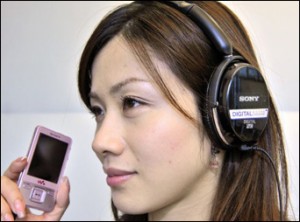The April hacker thefts of millions of customers’ personal records have been a bruising experience for the Japanese consumer electronics giant, not least because its network security failures have left it with a potential bill of up to $1 billion.
But also under threat is its core strategy of growing online revenues to replace income from appliances where it has been losing ground in areas such as televisions and portable music players.
“What is important is that they make attractive products. Unless they do that, why should consumers choose to buy Sony products?” said Toshiyuki Kanayama, an analyst at Monex.
“Sony says it wants to bring its software to its hardware. Look at Apple. Software followed its attractive products” such as iPhones, he said.
“The creative corporate culture of Sony was lost somewhere. It’s not easy to regain that. But they must work at it to bring original, attractive products,” he said.
Sony was once seen as a revolutionary force dismantling the old corporate fortress. Its history spans six decades during which its best-selling products have become part of mainstream culture.
Since it listed on the Tokyo Stock Exchange in December 1958, the company has been first in the world with a slew of white-hot innovations including the portable television, the integrated circuit radio, the video cassette recorder and the CD player.
When the cool kids were listening to Pink Floyd’s “Another Brick In The Wall” in 1980, they were doing so on their Walkman portable cassette players — another world first for Sony.
The first PlayStation two decades later completely dominated the TV games console market and the PlayStation 3 is leading the way in the fantasy world of online gaming.
But the company is struggling to answer the charge that, unlike Apple in the age of the iPhone 4 and iPad, it has lost the ability to develop category-defining hit products.
“There is nothing that will drive growth,” the Nikkei newspaper complained, adding that Sony’s expected profit this year would come largely from cost cutting.
“It has been a while since Sony stopped bringing out innovative products that create new markets, like it did with the Walkman music player,” it said.
Some analysts believe it has been all the more difficult for Sony to recover from the breach of its PlayStation network by hackers precisely because the company has lost the goodwill it built up in the glory days of the Walkman.
The cyber attacks since April involved the theft of personal data of more than 100 million accounts on its PlayStation Network and Sony Online Entertainment services.
Sony is only gradually bringing the services back online after promising to beef up security.
Meanwhile hackers have attacked Sony Ericsson’s Canadian website, as they did with Sony sites in Thailand, Indonesia and Greece.
The company has estimated that the cyber attacks could cost it 14 billion yen ($172 million), not counting compensation claims.
But speculation has been rife that the security breach could cost anything from $1 per customer to $10 or more, including damages, bringing the total bill potentially beyond $1 billion.
“Who knows what will happen? This could end now. This could end with massive damage. The data could end up in wrong hands and result in real damage and costly lawsuits,” said Kanayama at Monex.
Last week Sony posted a $3.2 billion loss, due in part to Japan’s March 11 earthquake and tsunami. But it is not all doom and gloom.
Despite suffering its third annual loss in a row in the year to March, the company forecast a return to the black this year.
Goldman Sachs said the hacking scandal would soon blow over as the company faces up to the difficult challenge of doing business in post-quake Japan.
“We think it is a matter of time until concern over the attacks and the earthquake impact fades,” the broker said in a note to clients.
Nomura Securities analyst Shiro Mikoshiba warned against excessive pessimism as Sony’s earnings may rebound.
“Sony is gradually emerging out of the worst period, when it could not explain how the earthquake and security breach affected its finances,” Mikoshiba said.
“The broad scope of the security breach is becoming clear. The impact (from the natural disaster and hacking) on Sony’s earnings should be contained in the April-June quarter,” he said.
